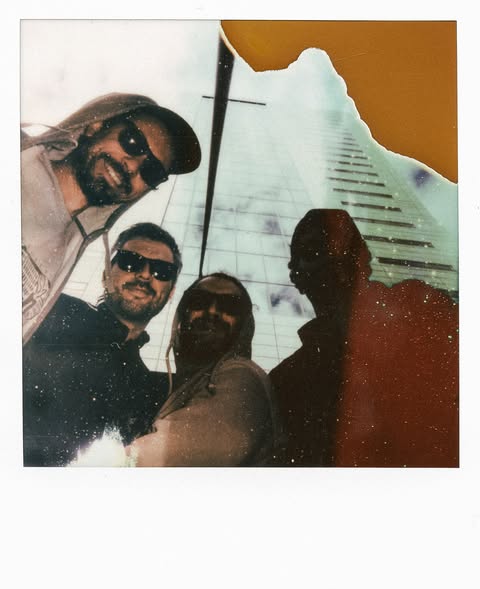Con la seguente chiacchierata con i francesi Sport, si chiude la rassegna delle interviste realizzate all’ultima edizione del Venezia Hardcore, a cui seguirà il live report in uscita nei prossimi giorni. La band transalpina è tra le principali del movimento midwest emo europeo, specialmente col disco di debutto Colors, uscito nel 2012, che spicca in una carriera di tutto rispetto. Dopo qualche anno di pausa tra il 2019 e il 2024, i Nostri sono recentemente tornati in attività, con il nuovo album In Waves uscito recentemente. Buona lettura!

Ciao ragazzi! Grazie per la disponibilità e benvenuti su Grind on the Road. Questo era il secondo concerto di questo tour, e immagino sia speciale suonare in un festival del genere, anche se non è la vostra prima volta in Italia. Com’è stato? L’avete apprezzato?
Il concerto è andato bene. É stato speciale per noi visto che ieri abbiamo iniziato a suonare canzoni dal nuovo album In Waves dal vivo, ed è stata una boccata d’aria fresca. L’anno scorso, quando siamo tornati a suonare, le sensazioni erano piacevoli, ma suonavamo canzoni di dieci anni fa, il che è bello, ma è ancora meglio avere nuovo materiale. Può essere intimidatorio, ma questi nuovi brani sono piacevoli da suonare e non particolarmente difficili.
Dato che siete da poco tornati in attività dopo un periodo di inattività, com’è stato rimettere in sesto la band? Sia per i concerti in giro per l’Europa che per quanto concerne la composizione di nuovo materiale.
Ci siamo praticamente dimenticati di non aver suonato per cinque anni. Quando abbiamo preso una pausa, aveva senso per noi, era la fine di qualcosa, ed è stato normale riprendere il gruppo e fare nuova musica adesso, quindi aveva senso. L’abbiamo voluto e l’abbiamo fatto, siamo molto motivati.
E ora avete anche un nuovo album in uscita a breve…
Ci ha fatto piacere registrarlo e suonare nuovamente insieme. Per alcuni di noi può essere difficile riascoltarlo ora, visto che tutto il processo ha richiesto molto tempo, ma le sensazioni son buone.
Quanto ha in comune con i dischi precedenti? Ci sono elementi nuovi che sono venuti fuori durante il processo compositivo?
Clem voleva fare un disco come Colors, ma quell’album è di tredici anni fa, quindi abbiamo cercato di fare qualcosa di nuovo. Il processo compositivo è stato organico, ci siamo trovati in una stanza assieme per tre o quattro giorni e abbiamo semplicemente suonato ciò che ci veniva spontaneo. Non ci sono state grosse discussioni, è stato tutto naturale, e siamo tutti stati d’accordo che è così che le cose sarebbero dovute andare. Abbiamo accettato il processo per ciò che è stato, e ne siamo felici.
Avete nominato Colors, l’inizio della vostra carriera dopo il primo EP. Volevo chiedervi in quegli anni quali fossero le vostre influenze principali.
Il midwest emo in generale, nel 2010 c’erano molte band interessanti nella scena, e la cosa ci rinvigoriva, quindi abbiamo provato a suonare punk rock con lo stesso approccio. Gli Algernon Cadwallader hanno avuto un grande impatto, sono stati la band che metteva d’accordo tutti come punto di riferimento. Anche i Title Fight forse, lo sono stati. Abbiamo sempre avuto un approccio metodico, con le nostre vecchie band spendevamo molto tempo in studio, registrando nuova musica, ma poi l’abbiamo iniziato a fare più velocemente, in soltanto un paio di giorni e registrando live, cercando di catturare quell’atmosfera. Inoltre, all’inizio le nostre influenze erano affini, quindi c’era una direzione generale, mentre col tempo si sono differenziate, ed è interessante perchè devi fare qualcosa di più personale. Questo è ciò che continuiamo a cercare di fare, magari qualche influenza si può sentire, ma è più qualcosa di nostro ora.
Se consideriamo il vostro nome, i titoli dei brani e le copertine, c’è un certo contrasto con l’introspezione tipica del midwest emo. Come sono nati il nome e tutto il resto? Pensando anche alle tracce del primo album, che riprendono i nomi delle Olimpiadi, ad esempio.
Il nome Sport è nato perché è uguale in molte lingue, è semplice e ci piacciono tutti gli sport, quindi all’epoca aveva senso. I riferimenti ai giochi olimpici sono venuti fuori perché ci piace anche la geografia e volevamo fare qualcosa legato al passato; per alcuni di noi era come un ricordo, per altri più una fantasia… e quindi poi abbiamo cambiato.
Per quanto riguarda i testi: li scrivete insieme o c’è qualcuno che se ne occupa in particolare? E quali sono i temi che trattate di solito?
Usiamo ChatGPT… (risate). Scherzi a parte, il nuovo album è stato scritto collettivamente. Poi è un po’ casuale il tutto, a volte c’è un tema specifico, come nella seconda canzone dell’album, “Caveat”, che parla del regista Werner Herzog. L’idea è di parlare di passione, ansia e sofferenza in un certo senso, cercando di renderli poetici. È come un gioco. Parliamo molto del crescere e dei sentimenti.
Avete suonato in giro per più di dieci anni, inizialmente dal 2010 al 2019 e poi negli ultimi anni siete tornati a suonare. Che differenze avete notato nella scena?
Dipende molto dai paesi. In Italia la scena hardcore è molto presente e le persone sono più entusiaste, mentre in altri paesi è diverso. in Germania, ad esempio, la gente è più tranquilla.
E quanto pensate che tutto questo sia cambiato col tempo?
Ora le persone sono più grandi, come noi, sono le stesse persone, solo con dieci anni in più. Non sempre, ieri ad esempio, a Lione, nostra città natale, c’erano dei ragazzi giovani, il che ci ha sorpreso molto. Ma ci sono anche tante persone che ci seguivano dieci anni fa e che oggi sono semplicemente cresciute. Comunque, come prima, dipende dal momento e anche dal paese. L’anno scorso, al nostro primo concerto in Italia dopo aver ripreso a suonare, qualcuno ci ha detto: “Ehi! Ho scoperto la vostra band ma non potevo vedervi dal vivo perché ero troppo giovane”, e questo è stato sorprendente, ma anche molto bello.
Hi guys! Thank you and welcome on Grind on the Road. It was the second show of this tour, and I think it was special in a festival like this, even if you played multiple times here in Italy. How was it? Have you enjoyed it?
It was really good. It was special for us because yesterday we started playing many new songs from the new album, In Waves, and it was refreshing. Last year when we started playing again it felt really good to do it, but we played songs from ten years ago, which is nice, but it’s more exciting to have new songs. Sometimes it can be scary, but actually new ones are very pleasant to play and not difficult.
Since you recently came back as a band after an inactive period, how was it to bring back the band, both for the shows around Europe but also recording new music after such a long time.
It’s like we forgot we weren’t playing for five years. When we stopped it made sense for us, it was the end of something, and it was normal to bring back the band and make some music now, so it made sense. We wanted it and we did it, we are very motivated.
And now you also have a new album coming out pretty soon…
It was great to record it and to play again together. For some of us it can be hard to listen to it as of now, because the whole process took a lot of time, but it feels really nice.
How much does it have in common with older releases? Is there something new that came out during the songwriting process?
Clem wanted to make an album like Colors, but that record is more than ten years old, so we tried to do something new. It was very organic, we got in a room together for three or four days and we just played what came to us. There wasn’t a lot of debate, it came naturally and we all agreed that this was what it was meant to be. We just accepted it as it was, and we’re happy about it.
You named Colors, the beginning of your career after the first EP. I wanted to ask in the first years what were your main influences.
Midwest emo generally speaking, in 2010 there were different interesting bands in the scene, and we thought it was rejuvenating for us, so we tried to play that same kind of punk rock. Algernon Cadwallader also did a lot, they were the band that we all agreed on as a reference. Then maybe Title Fight were also a reference for us. We always had a methodical approach. With our previous bands we used to spend a lot of time in the studio, recording new music, but then we started doing it in less time, taking just a couple of days and recording live. We tried to catch the live vibe. Moreover, at the beginning we had similar influences, and so a common direction, but then we started partying ways with the influences, and that’s interesting, because you have to make your own thing, kind of. That’s what we’re still trying to do, maybe you can still hear some influences but it’s more our thing now.
If we consider your name, the title tracks and the artworks there is a bit of a contrast with the introspection correlated with the whole midwest emo genre. How did the name and everything else came out? Also thinking about the tracks of the first album named after the Olympics, for example.
The Sport name came out since it’s the same in many languages, it’s simple and we love all kind of sports, so it made sense back then. The references with the olympic games came out because we also like geography and we wanted to do something from the past, for some of us it was like a memory, for others like fantasy… so then we changed.
About the lyrics: do you write them together or someone focuses on them? And what are the themes you usually talk about?
We use chat gpt… (laughs). Jokes aside, the new album was written collectively. Then it’s a bit random. Sometimes there is a specific theme, like the second song of the album, “Caveat”, is about the film director Werner Herzog. The deal with Sport is to talk about passion, anxiety and suffering in a way, trying to make it poetic. It’s like a game. We talk a lot about the whole growing up thing, and feelings as well.
You played around for more than ten years around, in the first place from 2010 to 2019 and then in the last couple of years when you came back playing. How many differences have you noticed around in the scene?
It depends a lot of the countries. In Italy the hardcore scene is very present and people are more excited, whereas in other countries it’s different, in Germany for example people are quieter.
And how much do you think all of this has changed with time?
Now people are older, like us, there are the same people that get older. Not always, yesterday in our hometown Lyon there were some kids, which was very surprising for us, but there are a lot of people that were around ten years ago and now are just ten years older. But, as before, it depends from time to time and also on the country. Last year where we played the first show in Italy someone told us “hey! I discovered your band but couldn’t see you live because I was too young”, and that was surprising, but also pleasant.


